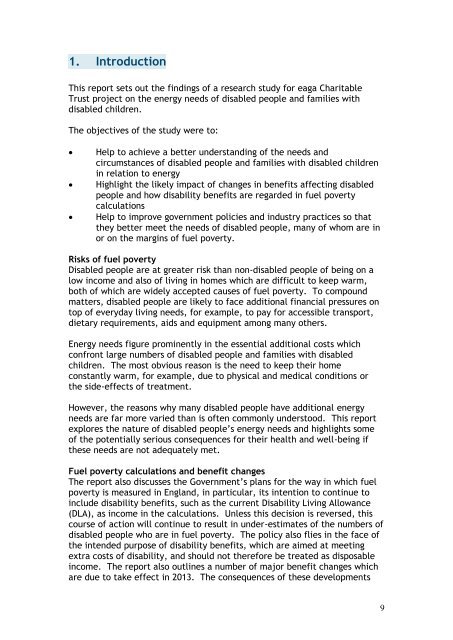the-energy-penalty-disability-and-fuel-poverty-pdf
the-energy-penalty-disability-and-fuel-poverty-pdf
the-energy-penalty-disability-and-fuel-poverty-pdf
You also want an ePaper? Increase the reach of your titles
YUMPU automatically turns print PDFs into web optimized ePapers that Google loves.
1. IntroductionThis report sets out <strong>the</strong> findings of a research study for eaga CharitableTrust project on <strong>the</strong> <strong>energy</strong> needs of disabled people <strong>and</strong> families withdisabled children.The objectives of <strong>the</strong> study were to:Help to achieve a better underst<strong>and</strong>ing of <strong>the</strong> needs <strong>and</strong>circumstances of disabled people <strong>and</strong> families with disabled childrenin relation to <strong>energy</strong>Highlight <strong>the</strong> likely impact of changes in benefits affecting disabledpeople <strong>and</strong> how <strong>disability</strong> benefits are regarded in <strong>fuel</strong> <strong>poverty</strong>calculationsHelp to improve government policies <strong>and</strong> industry practices so that<strong>the</strong>y better meet <strong>the</strong> needs of disabled people, many of whom are inor on <strong>the</strong> margins of <strong>fuel</strong> <strong>poverty</strong>.Risks of <strong>fuel</strong> <strong>poverty</strong>Disabled people are at greater risk than non-disabled people of being on alow income <strong>and</strong> also of living in homes which are difficult to keep warm,both of which are widely accepted causes of <strong>fuel</strong> <strong>poverty</strong>. To compoundmatters, disabled people are likely to face additional financial pressures ontop of everyday living needs, for example, to pay for accessible transport,dietary requirements, aids <strong>and</strong> equipment among many o<strong>the</strong>rs.Energy needs figure prominently in <strong>the</strong> essential additional costs whichconfront large numbers of disabled people <strong>and</strong> families with disabledchildren. The most obvious reason is <strong>the</strong> need to keep <strong>the</strong>ir homeconstantly warm, for example, due to physical <strong>and</strong> medical conditions or<strong>the</strong> side-effects of treatment.However, <strong>the</strong> reasons why many disabled people have additional <strong>energy</strong>needs are far more varied than is often commonly understood. This reportexplores <strong>the</strong> nature of disabled people’s <strong>energy</strong> needs <strong>and</strong> highlights someof <strong>the</strong> potentially serious consequences for <strong>the</strong>ir health <strong>and</strong> well-being if<strong>the</strong>se needs are not adequately met.Fuel <strong>poverty</strong> calculations <strong>and</strong> benefit changesThe report also discusses <strong>the</strong> Government’s plans for <strong>the</strong> way in which <strong>fuel</strong><strong>poverty</strong> is measured in Engl<strong>and</strong>, in particular, its intention to continue toinclude <strong>disability</strong> benefits, such as <strong>the</strong> current Disability Living Allowance(DLA), as income in <strong>the</strong> calculations. Unless this decision is reversed, thiscourse of action will continue to result in under-estimates of <strong>the</strong> numbers ofdisabled people who are in <strong>fuel</strong> <strong>poverty</strong>. The policy also flies in <strong>the</strong> face of<strong>the</strong> intended purpose of <strong>disability</strong> benefits, which are aimed at meetingextra costs of <strong>disability</strong>, <strong>and</strong> should not <strong>the</strong>refore be treated as disposableincome. The report also outlines a number of major benefit changes whichare due to take effect in 2013. The consequences of <strong>the</strong>se developments9


